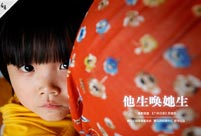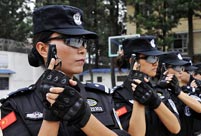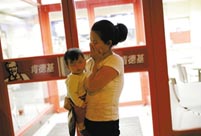 China's new-type guided missile frigate 'Bengbu' in live fire training
China's new-type guided missile frigate 'Bengbu' in live fire training
 China’s weekly story (2013.8.10 - 8.23)
China’s weekly story (2013.8.10 - 8.23)
 Flight team performs first show abroad
Flight team performs first show abroad
 With parents bedridden, 12-year-old boy becomes pillar of the family
With parents bedridden, 12-year-old boy becomes pillar of the family
 Top 10 private Chinese enterprises 2013
Top 10 private Chinese enterprises 2013
 The most gorgeous Chinese women in the eyes of foreigners
The most gorgeous Chinese women in the eyes of foreigners
As China marked the 68th anniversary of its victory in the Anti-Japanese War (1937-1945), one Chinese family's reflections on Japan were markedly mixed.
While veteran Zhang Lizhi was immersed in bitter wartime memories, the attitude of his grandson, Liu Pinran, was profoundly affected by a recent exchange program that allowed him to visit Japan together with other Asian students majoring in international relations.
"My hatred fades, but never my memories," said 94-year-old Zhang.
Born in 1919 in Juxian County of east China's Shandong Province, he joined the army as a teen to fight the Japanese who invaded China in 1937.
"There was no choice, even for a teenager like me. It was my duty to defend my motherland," he believes.
Of all his wartime souvenirs, including a scar left by a bullet passing through his left palm, he most cherishes a sepia picture in which four young armymen in winter uniforms stand solemnly.
The picture was taken in the autumn of 1944, when Zhang and his fellow soldiers of the Communist Party of China survived a raid by Japanese troops in Shandong.
The war was seven years old by then. As news of territory recovery and Japanese retreat reached their camp, Zhang and his friends felt with great confidence that the war was close to its end.
"But two of them were killed by the Japanese just a few days after the photo was taken. One was shot to death, the other was buried alive," recalled Zhang.
This episode of Zhang's wartime story has also became unforgettable to Liu Pinran, a postgraduate majored in international relations at the prestigious Peking University. He grew up hearing his grandfather tell the tale behind the image "countless times."
"My grandpa has talked less about the war in recent years, but I can feel his anger and grief whenever the topic comes up," said Liu.
Despite close economic ties, memories of Japanese militarism run deep in China, which had 21 million civilians and soldiers killed and 14 million others injured in the war.
The feelings of Zhang's generation are more or less carried on by Chinese youngsters nowadays, amid renewed tensions following the Japanese government's unilateral move in September 2012 to "nationalize" part of the Diaoyu Islands, which have been Chinese territory since ancient times.
Japanese cabinet members' worshipping of the war-linked Yasukuni Shrine on Aug. 15, the day of Japan's surrender at the end of World War II, further strained the two countries' already tense relations.
Liu shares his grandfather's firm stand on defending China's territory and his anger over Japanese wartime atrocities, but his curiosities mounted as well on what exactly ordinary Japanese people thought about their shared past.
"I heard a lot about Japan and the war since I was a kid, but little of it came from the Japanese themselves," he explained.
Like many of his peers, Liu has built his knowledge of Japan and the eight-year war mostly from textbooks and TV. But unlike others, he has heard some different views on Japan within his family since he was a kid.
His youngest uncle, Liu Xing, studied mechanical engineering at Kobe University and later worked for a Japanese firm in the 1990s.
As much as he was deeply influenced by the war histories, Liu Xing also admired the advanced technology and efficiency of the Japanese.
"My uncle often told the family that Japan was an advanced country with polite people," said Liu Pinran. "Actually, my first impression about Japan was from the toy cars he brought me from there. I liked them so much and showed them off to my friends."
Confused by the family's different views on Japan, Liu Pinran decided to find answers by himself.
He was lucky enough to be recruited by CAMPUS Asia, a university student exchange program initiated by the governments of China, Japan and Korea of Republic since 2009, for a 12-day trip to Japan in July .
All 40 participants were majoring in international relations. They discussed controversial issues ranging from the Anti-Japanese War to disputes over the Diaoyu Islands, according to Liu.
"Misunderstanding between the two countries have long existed, but I found all the students eager to communicate and there were no extreme views during discussion," he said.
"For instance, Japanese students believe that their government officials above minister-level should stop visiting the Yasukuni Shrine. We came up with the idea of building a peace monument next to the shrine. Why not worship peace instead?"
While Japan routinely apologizes for its wartime actions, its politicians often anger the neighboring countries that bore the brunt of its colonial aggression by visiting the Yasukuni Shrine, a Japanese memorial honoring war dead including top war criminals.
Liu visited the shrine as his last stop in Japan.
In Yushukan, where Japanese war documents are on display, the guestbook drew Liu's attention. Of all the comments, mostly in Japanese and English, two paragraphs of Chinese caught his eye.
The first paragraph by a Chinese studying in Japan says, "We shared a long history of friendly relationship. Though disputes exit, we should face history objectively and any kind of war should be forbidden for the sake of peace."
"The following paragraph, like a reply to the first, was addressed in shaky Chinese handwriting by a Japanese who now studies in China: 'I thought Chinese would write hateful words here about Japan, but now I feel so sorry to think in this way, I really hope we can improve our relationship and learn from each other,'" said Liu.
"I was so moved and I see hope. When communications between the governments freeze, people-to-people exchanges between the two countries become more precious and important," he said.
Liu told his grandfather of the "dialogue" after he returned to China. The old man responded with a lengthy silence.
 Mexican president delivers first State of Nation address
Mexican president delivers first State of Nation address Highlights of MAKS 2013 Int'l Aviation and Space Show
Highlights of MAKS 2013 Int'l Aviation and Space Show  10th China-ASEAN Expo opens in Nanning
10th China-ASEAN Expo opens in Nanning Baby born to save his sister - the story of a savior sibling
Baby born to save his sister - the story of a savior sibling Lady of mystery: Female SWAT team in prison disclosed
Lady of mystery: Female SWAT team in prison disclosed  Single mother, baby live in KFC restaurant for months
Single mother, baby live in KFC restaurant for months Fan Bingbing poses for Malaysian magazine Citta Bella
Fan Bingbing poses for Malaysian magazine Citta Bella Zhang Xinyi covers COSMOPOLITAN
Zhang Xinyi covers COSMOPOLITAN A collection of bizarre rooftop buildings around China
A collection of bizarre rooftop buildings around China Putin intimate contacts with marine animals
Putin intimate contacts with marine animals China's frigate 'Bengbu'in fire training
China's frigate 'Bengbu'in fire training Fresh students 'forced' to register in university independently
Fresh students 'forced' to register in university independently 2013 Taiwan Int'l Tourism Expo kicks off in Taipei
2013 Taiwan Int'l Tourism Expo kicks off in Taipei Photo story: Take a gap year
Photo story: Take a gap year Nokia's Global Headquarters: visiting a declining empire
Nokia's Global Headquarters: visiting a declining empireDay|Week|Month